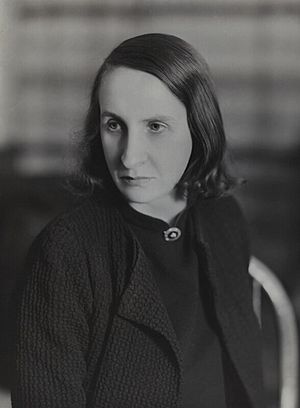Elisabeth Lutyens facts for kids

Agnes Elisabeth Lutyens (July 9, 1906 – April 14, 1983) was an English composer. She was known for her unique musical style. She also composed music for many films and radio shows.
Contents
Early Life and Musical Beginnings
Elisabeth Lutyens was born in London on July 9, 1906. Her mother was Lady Emily Bulwer-Lytton. Her father was the famous architect Sir Edwin Lutyens. Elisabeth was one of five children. Her younger sister, Mary Lutyens, became a writer.
From a young age, Elisabeth was interested in music. When she was nine, she decided she wanted to be a composer. In 1922, she went to Paris to study music. She attended the École Normale de Musique de Paris. Later, she studied at the Royal College of Music in London from 1926 to 1930.
Family and Personal Life
In 1933, Elisabeth Lutyens married Ian Glennie, a singer. They had twin daughters and a son. Her first marriage ended. In 1942, she married Edward Clark, a conductor. They had a son together. Elisabeth continued to compose music while raising her children.
A Career in Music
Composing New Sounds
Elisabeth Lutyens was a talented composer. In 1945, she wrote a piece called The Pit. This work was performed in London in 1946. She also found success in 1947 with a cantata. A cantata is a piece of music for voices and instruments. This work was based on a poem by Arthur Rimbaud.
The BBC (British Broadcasting Corporation) played many of her works. This happened from the 1940s to the 1950s. She also wrote music for poetry readings. Elisabeth had strong opinions about music. She sometimes criticized other English composers. She called their music "the cowpat school."
Music for Movies and Radio
Elisabeth Lutyens also composed music for films. She wrote scores for horror movies made by Hammer Film Productions. She also worked for their rival, Amicus Productions. She was the first British woman to compose music for a feature film. Her first film score was for Penny and the Pownall Case in 1948.
Some of her other film scores include:
- Never Take Sweets from a Stranger (1960)
- Paranoiac (1963)
- Dr. Terror's House of Horrors (1965)
- The Skull (1965)
She was sometimes called the "Horror Queen." She enjoyed this nickname. She also wrote music for many documentary films. Her music was used for BBC radio and TV shows. She also composed music for stage plays.
By the late 1960s, her music became more popular. She received important requests to compose new pieces. In 1969, she was honored with the title of Commander of the Order of the British Empire (CBE). This is a special award in the UK.
Her Autobiography
In 1972, Elisabeth Lutyens published her autobiography. An autobiography is a book about a person's own life. Her book was called A Goldfish Bowl. It described what it was like to be a female musician in London. She said she wrote the book to share her husband Edward Clark's achievements.
Later Years and Legacy
Elisabeth Lutyens passed away in London in 1983. She was 76 years old. She left behind a large collection of musical works.
Selected Works
Elisabeth Lutyens composed many different types of music. Here are some examples:
Chamber Music
- String Quartet II, Op. 5, No. 5 (1938)
- String Trio, Op. 5, No. 6 (1939)
- Valediction, for clarinet and piano, Op. 28 (1953–54)
- Wind Quintet, Op. 45 (1960)
Vocal and Choral Music
- Ô saisons, Ô châteaux! – cantata after Rimbaud, Op. 13 (1946)
- Requiem for the Living, for soloists, chorus and orchestra, Op. 16 (1948)
- The Valley of Hatsu-Se, for soprano, flute, clarinet, cello and piano, Op. 62 (1965)
- And Suddenly It's Evening, for tenor and 11 Instruments, Op. 66 (1965)
Solo Instrumental Music
- 5 Intermezzi, for piano, Op. 9 (1941–42)
- Piano e Forte, for piano, Op. 43 (1958)
- Five Bagatelles, for piano, Op. 49 (1962)
- The Dying of the Sun, for guitar, Op. 73 (1969)
Orchestral Music
- Three Pieces, Op. 7 (1939)
- Viola Concerto, Op. 15 (1947)
- Quincunx, for orchestra with soprano and baritone soloists, Op. 44 (1959–60)
Opera and Music Theatre
- Infidelio – seven scenes for soprano and tenor, Op. 29 (1954)
- The Numbered – opera in a Prologue and four acts, Op. 63 (1965–67)
See also
 In Spanish: Elisabeth Lutyens para niños
In Spanish: Elisabeth Lutyens para niños

